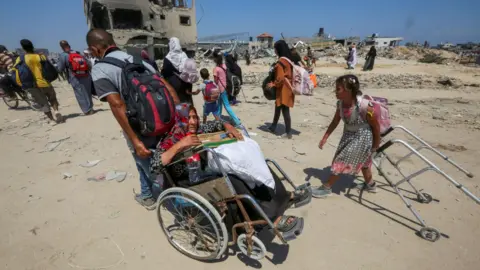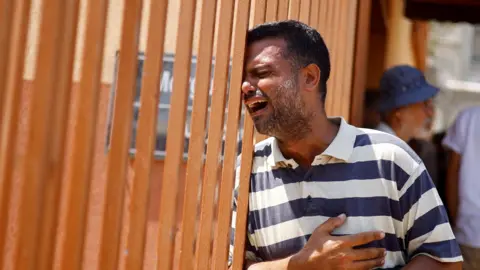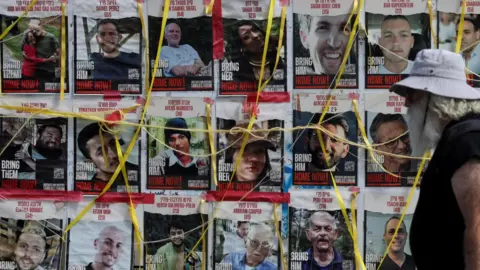 Reuters
ReutersThe casualties were brought to Nasser hospital, in the west of Khan Younis, which the ministry said needed donations of blood to help treat them.
Medics told Reuters news agency that tank salvoes had killed many people in the town of Bani Suhaila, just over a mile (about 2km) east of Khan Younis.
Unconfirmed reports citing eyewitnesses also said tanks had entered Khan Younis.
Much of Gaza’s second city was destroyed in an Israeli offensive which ended in April, but large numbers of people returned after troops began an operation in nearby Rafah in early May.
At the start of this month, they were displaced once again after the Israeli military issued a fresh evacuation order for other eastern neighbourhoods of Khan Younis as well as nearby towns and villages, including Bani Suhaila.
They were instructed to go to the humanitarian zone – which stretches along the coast from al-Mawasi to the central town of Deir al-Balah – despite warnings from the UN that it was already overcrowded with tents and lacking basic services and critical infrastructure.
 Reuters
ReutersMahmoud Abu Saqr, 46, told the BBC that he and his family had fled Bani Suhaila on Monday and were now “sitting on the street” in the humanitarian zone.
“No-one can buy a tent. There is no way anywhere here to put up a new tent, even if we had money,” he said.
“The Israeli artillery stationed on the border has been shelling our town since the morning. We were displaced to Rafah in November and returned to the town after the army asked us to do so. Today, we received a text message on our phone.”
He added: “There is no such thing as a safe area. It is all a lie.”
The Israeli military said it was trying to “keep civilians away from areas of combat” and that the humanitarian zone’s boundaries were adjusted “in accordance with precise intelligence indicating that Hamas has embedded terrorist infrastructure in the area”.
In response, Hamas called on the international community “to take urgent action to stop the series of systematic Zionist killing against our people”.
Israel launched a campaign in Gaza to destroy Hamas in response to an unprecedented attack on southern Israel on 7 October, during which about 1,200 people were killed and 251 others were taken hostage.
More than 39,000 people have been killed in Gaza since then, according to the territory’s health ministry.
 Reuters
ReutersIn a separate development on Monday, the Israeli military confirmed the deaths in captivity of two more Israeli hostages, based on intelligence information.
A statement said an investigation was being carried out into the circumstances of the deaths of Yagev Buchshtab, 35, and Alex Dancyg, 76, who also had Polish citizenship. Israeli media reports cited military sources as saying there was a “high probability” that at least one of the men was killed by Israeli fire.
“Yagev and Alex were taken alive and should have returned alive to their families and to their country,” the Hostages and Missing Families Forum said in a statement. “Their death in captivity is a tragic reflection of the consequences of foot-dragging in negotiations.”
The forum demanded that Israeli Prime Minister Benjamin Netanyahu immediately approve a proposed ceasefire and hostage release deal with Hamas.
Mr Netanyahu’s office said on Sunday that he had held an in-depth discussion with Israel’s negotiating team and directed them to take part in the next round of indirect talks mediated by Qatar and Egypt later this week.
Israel says 116 hostages are still being held in Gaza, 44 of whom are presumed dead. There are another four hostages who were kidnapped before 7 October. Two of them are believed to be dead.
The Israeli military also said on Monday that it was looking into a report that its forces had fired at a marked UN convoy that was heading to Gaza City.
The head of the UN agency for Palestinian refugees (Unrwa), Philippe Lazzarini, said an armoured car had been hit by at least five bullets while waiting near an Israeli checkpoint south of the Wadi Gaza river valley on Sunday. The vehicle was severely damaged and UN staff had to take cover, but there were no casualties.
Mr Lazzarini said the convoy’s movement had been co-ordinated with Israeli authorities and demanded that “those responsible must be held accountable”.

